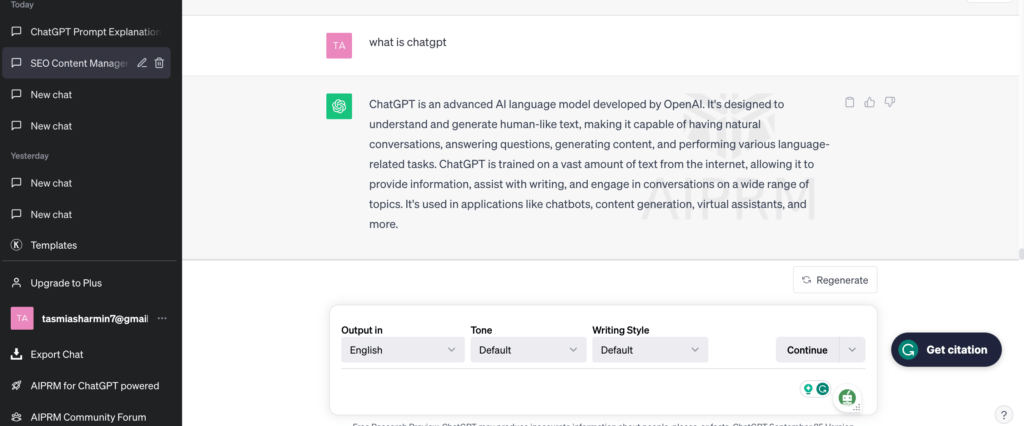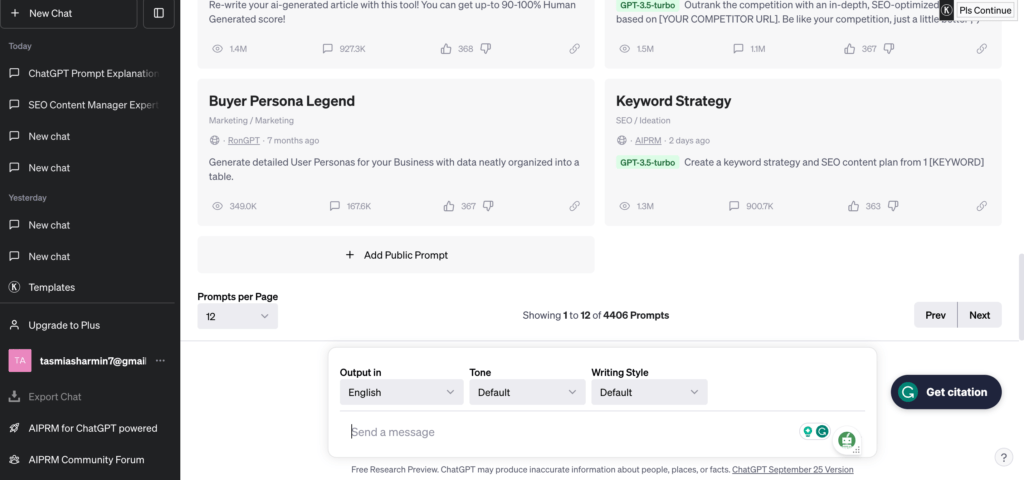Welcome to the world of “ChatGPT Prompts for AI Writing.”
In the ever-evolving landscape of content creation, one tool stands out as a wizard of words: ChatGPT. But what’s the secret spell behind its enchanting output?
It’s all in the prompts—those mystical instructions that guide ChatGPT to generate brilliant content. Join us as we embark on a journey to demystify these awesome chat gpt prompts, explore their varieties, and reveal the art of crafting them.
Whether you’re conjuring SEO-optimized blog posts, academic papers, or imaginative scripts, this guide will empower you to harness the full potential of ChatGPT. Your adventure into the realm of AI-driven content creation begins here. [Keep reading; I’ll give you a secret chatgpt prompts wizard somewhere in this blog to do all this in one click.]
Table of Contents
What Are ChatGPT Prompts?
ChatGPT prompts are specific instructions or queries given to ChatGPT, an AI language model, to generate text-based responses. These prompts serve as input to the AI system, guiding it to produce coherent and contextually relevant output, such as answers to questions, content generation, or creative writing.
For example, if you want to have a conversation with ChatGPT about a particular topic, you can start with a prompt like, “Let’s talk about climate change,” and the model will generate responses based on that topic.
What are the five varieties of Chatgpt prompts?
Here are five varieties of prompts you can use with ChatGPT:
- Exploratory Prompts: These prompts encourage ChatGPT to explore a topic or concept. For example, “Tell me everything you know about black holes.”
- Creative Prompts: Challenge ChatGPT to generate creative content, such as stories, poems, or imaginative scenarios. For instance, “Write a science fiction story set on a distant planet.”
- Comparative Prompts: Ask ChatGPT to compare and contrast different ideas or elements. For example, “Compare the advantages and disadvantages of renewable energy sources.”
- Problem-Solving Prompts: Prompt ChatGPT to solve problems or provide solutions to specific challenges. For instance, “Suggest strategies to reduce plastic waste in the ocean.”
- Question-Answer Prompts: Use prompts that involve asking ChatGPT questions or seeking explanations. For example, “Explain the concept of artificial intelligence in simple terms.”
These different varieties of prompts allow you to tailor your interactions with ChatGPT to a wide range of tasks and objectives, from exploration and creativity to analysis and problem-solving.
Why Use ChatGPT Prompts for AI Writing?
Using ChatGPT prompts for AI writing offers several advantages:
- Customization: Prompts allow you to specify the type of content you need, such as articles, blog posts, or answers to specific questions.
- Clarity: By providing clear instructions in your prompts, you can ensure that the AI generates the desired content with precision.
- Efficiency: Prompts streamline the content generation process, saving time and effort in crafting text manually.
- Consistency: Prompts help maintain a consistent tone, style, and format throughout the generated content.
- Variety: You can create a range of content by using different prompts, making ChatGPT a versatile tool for various writing tasks.
In summary, ChatGPT prompts serve as the bridge between human intent and AI-generated content, enabling efficient and tailored content creation.
What are the best writing prompts for ChatGPT?

If you’re wondering, “What are some cool prompts?” Here, we’ve covered you all.
Discover the best writing prompts for ChatGPT, covering a wide range of content needs. From SEO-optimized blog posts to engaging interviews, academic writing, scripts, GitHub projects, affiliate marketing, and business strategies, these prompts empower your creativity and structure your content effectively.
Wait, Wait, Wait!
Before writing any prompts, write a background history to set up Chatgpt context. It’s like pampering ChatGpt!
Write something like- “You are an experienced [XXX] writing expert with a track record spanning over a decade. With more than 10 years in the field, you’ve successfully orchestrated numerous [XXX] campaigns and crafted effective strategies. Your portfolio boasts an impressive collection of [100+ XXX], a testament to your expertise in optimizing online content.
Chatgpt Prompt 1: SEO-Optimized Blog Post
- “Craft a [XXXX] word blog post titled ‘[TITLE]’ on the topic of [TOPIC]. Optimize the post for search engines by incorporating relevant keywords strategically throughout the content. Ensure that the blog post provides valuable information, incorporates engaging visuals, and features at least [NUMBER] subheadings for easy readability. Include a meta title and description that entices readers and adheres to SEO best practices.” Read ChatGPT for SEO: Game-Changer or Hype in SEO Optimization
Read ChatGPT AI Writing: Unleash Creativity, Maximize Content
Chatgpt Prompt 2: How-To Blog Post
- “Write a [XXXX] word how-to blog post titled ‘[TITLE]’ in an [INFORMATIVE/ENGAGING] tone. Target an audience interested in [TOPIC]. Structure the post with clear, numbered steps, providing detailed explanations and tips for each step. Enhance the post with visuals or illustrations to aid comprehension. Conclude the post by summarizing key takeaways and encouraging readers to try out the steps themselves.”
For more details read How to Write a Blog with AI Writing Tool ChatGPT
Chatgpt Prompt 3: Listicle Blog Post
- “Write a [XXXX] word listicle blog post titled ‘[TITLE]’ that covers the top [NUMBER] [TOPIC]-related [ITEMS/STRATEGIES/IDEAS]. The blog post should be engaging and informative for [AUDIENCE]. Each item should have a short description, and the post should include a captivating introduction and conclusion.”
Chatgpt Prompt 4: Case Study Blog Post
- “Craft a [XXXX] word case study blog post titled ‘[TITLE]’ in a [TONE] tone. The post should target an audience of [AUDIENCE] and focus on a real-life success story. Describe the problem, the solution, and the results achieved. Include tables to illustrate key points.”
Chatgpt Prompt 5: Expert Interview Blog Post
- “Write a [XXXX] word expert interview blog post titled ‘[TITLE]’ for [AUDIENCE]. Select an industry expert or thought leader in [NICHE]. The post should feature a Q&A-style interview with insightful questions and answers. Provide an introduction that highlights the expert’s background and a conclusion that encourages readers to share their thoughts.”
Chatgpt Prompt 6: Product Review Blog Post
- “Craft a [XXXX] word product review blog post titled ‘[TITLE]’ in an [EVALUATIVE/INFORMATIVE] tone. Target an audience interested in [PRODUCT CATEGORY]. Share your detailed review of the [PRODUCT NAME], covering its features, benefits, pros, and cons. Include high-quality images of the product to accompany your analysis.”
ChatGPT Prompts for Research Paper Writing:
- “Develop a concise research question for a paper investigating the impact of ‘[PHENOMENON]’ on [SPECIFIC AREA]. Clarify the significance of this study in the context of current research.”
- “Write an abstract for a research paper on ‘[TOPIC].’ Summarize the objectives, methodology, and anticipated findings, highlighting the potential implications for future studies.”
ChatGPT Prompts for Academic Writing:
- “Compose a thesis statement for an academic essay exploring the role of ‘[CONCEPT]’ in [HISTORICAL PERIOD]. Emphasize the unique perspective this research will offer to the field.”
- “Outline the structure of a critical analysis paper on ‘[LITERARY WORK].’ Include key points, subtopics, and a brief description of the analytical approach.”
ChatGPT Prompts for Script Writing:
- “Write a captivating opening scene for a suspenseful thriller script set in a [UNIQUE LOCATION]. Create an atmosphere of intrigue and introduce the main characters.”
- “Craft a heartfelt dialogue between two characters in a romantic comedy script. Capture the essence of their personalities and the humorous dynamics between them.”
ChatGPT Prompts for GitHub:
- “Draft a clear and concise README.md file for a GitHub repository focused on ‘[PROJECT NAME].’ Provide an overview, installation instructions, and usage guidelines.”
- “Create a commit message for a recent code update in a GitHub repository. Clearly convey the changes made and their significance in improving the project.”
ChatGPT Prompts for Affiliate Marketing:
- “Write an attention-grabbing email subject line for an affiliate marketing campaign promoting ‘[PRODUCT].’ Spark curiosity and encourage recipients to open the email.”
- “Craft a persuasive social media post promoting an affiliate product [XYZ]. Showcase its unique benefits and provide a compelling call-to-action to drive conversions.”
ChatGPT Prompts for Business:
- “Compose a mission statement for a startup company specializing in ‘[INDUSTRY].’ Articulate the company’s core values, goals, and commitment to innovation.”
- “Create an elevator pitch for a new business venture centered around ‘[INNOVATIVE IDEA].’ Capture the essence of the concept and its potential impact on the market.”
Feel free to customize these prompts with specific details, such as word count, title, tone, audience, and niche, to align them with your brand’s content strategy. These prompts offer diverse options for creating engaging and informative posts.
What are some of the best Chatgpt prompt generators?
Some of the best Chatgpt prompts generators are-
- ChatX
- Feedough
- Flow GPT
- Prompt.chat
- ChatGPT (Itself)
Tips for getting the best results from Chatgpt
Wondering how I get the best results from ChatGPT? Here are some tips:
- Clear and Specific Prompts: Start with a well-defined and clear prompt to convey your intentions effectively.
- Experiment: Feel free to iterate and experiment with different phrasing and instructions to refine your results.
- Contextual Information: Provide relevant context or background information to help ChatGPT understand your request better.
- Ask for Step-by-Step: If seeking a detailed response, request that ChatGPT provide information or solutions in a step-by-step format.
- Review and Edit: Always review thoroughly and edit the content to ensure accuracy and alignment with your needs.
- Use Moderation: When generating content, be mindful of ethical guidelines and use moderation to filter any inappropriate or biased output.
- Check Facts: Verify any factual information provided by ChatGPT, as it may not always be accurate.
- SEO Optimization: If creating content for SEO, incorporate relevant keywords and ensure the content meets SEO best practices.
- Practice Patience: ChatGPT’s responses may vary, so be patient and fine-tune your prompts for optimal results.
- Human Touch: While ChatGPT is a valuable tool, remember that human input and judgment remain essential, especially for critical tasks.”
These tips should help you make the most of your interactions with ChatGPT.
How do I master ChatGPT prompts?
To master ChatGPT prompts uniquely, consider these distinctive approaches:
- Craft Creative Scenarios: Challenge ChatGPT with imaginative scenarios, such as “Write a dialogue between historical figures discussing modern technology.”
- Set Constraints: Experiment with prompts that impose limitations, like “Compose a story in exactly 50 words” or “Summarize a complex concept in a single sentence.”
- Reverse Engineering: Ask ChatGPT to reverse engineer a process, like “Explain how to uncook a scrambled egg,” which encourages creative problem-solving.
- Generate Analogies: Prompt the AI to create analogies, such as “Compare effective leadership to conducting an orchestra.”
- Interactive Storytelling: Collaborate with ChatGPT by taking turns in storytelling, with you providing the first sentence and the AI continuing the narrative.
- Ask for Multiple Perspectives: Request that ChatGPT generate content from various viewpoints, fostering diverse and well-rounded responses.
- Use Uncommon Prompts: Explore niche or less common topics to stimulate unique insights and responses.
- Challenge Historical Knowledge: Test ChatGPT’s historical knowledge with prompts like “Write a letter as if you were a famous historical figure.”
- Create Interactive Games: Develop prompts for interactive games like riddles, puzzles, or trivia quizzes.
- Leverage Emotional Depth: Encourage ChatGPT to delve into emotional depth by asking it to write from a specific emotional perspective or create emotionally charged content.
- Artistic Inspirations: Request ChatGPT to generate content inspired by specific artworks, music, or literary works.
- Explore Futuristic Scenarios: Challenge the AI to predict future developments or imagine scenarios in a futuristic world.
- Incorporate User Feedback: Adjust prompts based on AI-generated responses and incorporate user feedback for iterative improvements.
- Collaborative Worldbuilding: Engage ChatGPT in collaborative worldbuilding by asking it to contribute to the creation of fictional worlds, characters, or cultures.
- Quantum Creativity: Experiment with quantum-inspired prompts, such as “Write a story where a character simultaneously exists in multiple parallel universes.”
Remember to review and fine-tune ChatGPT’s responses, as unique prompts can yield diverse but occasionally unexpected results. Continual exploration and adaptation will enhance your mastery of ChatGPT prompts.
Will ChatGPT replace content writers?
ChatGPT and similar AI models are valuable tools for content writers, but they are unlikely to replace human content writers entirely. While AI can assist in generating content, it lacks the creativity, intuition, and nuanced understanding of human writers. Content writers bring a unique voice, style, and storytelling ability that is challenging for AI to replicate. Instead of replacement, AI is more likely to complement human writers by streamlining certain tasks and offering inspiration, allowing writers to focus on higher-level creative and strategic aspects of their work.

Download APRM for Chatgpt. You’ll get more than 4400, 1-click prompts.
FAQs About ChatGPT Prompts for AI Writing
Can writers use ChatGPT?
Yes, writers can certainly use ChatGPT as a helpful tool for brainstorming ideas, generating content, and overcoming writer’s block. It can provide inspiration and assist in content creation.
Will ChatGPT replace editors?
ChatGPT can assist with proofreading and suggesting improvements, but it is not a replacement for human editors. Skilled human editors bring a level of creativity, context, and nuanced judgment that AI cannot fully replicate.
Is ChatGPT content good for SEO?
ChatGPT-generated content can be a valuable starting point for SEO, but it often requires additional optimization. Writers should ensure that the content aligns with SEO best practices, includes relevant keywords, and meets the needs of the target audience.
Is it possible to jailbreak ChatGPT?
Jailbreaking ChatGPT or using it for malicious purposes is against OpenAI’s terms of use and is not recommended. Ethical and responsible use of AI is encouraged.
How long can ChatGPT 4 prompts be?
ChatGPT 4 prompts can be quite flexible in length, typically accommodating several sentences or even a short paragraph. However, extremely long prompts may result in truncated or less coherent responses.
Can ChatGPT generate images?
No, ChatGPT primarily generates text-based responses. It does not have the capability to create images.
Can ChatGPT write 5,000 words?
Yes, ChatGPT can generate lengthy content, including 5000-word articles or documents, although the quality and coherence of such lengthy content may vary.
Is ChatGPT good for blogging?
Yes, ChatGPT can serve as a valuable resource for sparking ideas, creating outlines, and even generating initial drafts of blog posts. Nonetheless, it remains crucial for bloggers to conduct thorough reviews and edits, guaranteeing that the content aligns seamlessly with their unique requirements and preferred writing style.
Can you publish ChatGPT content?
Yes, you can publish content generated by ChatGPT, but it’s essential to review and edit it thoroughly to ensure accuracy, quality, and alignment with your intended message and audience. Always verify information and adhere to ethical content creation practices.
Conclusion:
As we conclude our journey into the enchanting realm of ChatGPT prompts, remember that the world of AI-driven content generation is not bound by the ordinary. It’s a universe of limitless possibilities where your curiosity is the compass, and the prompts are your guiding stars.
From SEO-optimized blog posts to in-depth research papers, captivating scripts, and strategic business insights, the power of ChatGPT prompts lies in your hands. So, dare to dream, experiment, and redefine the boundaries of creativity.
The adventure has just begun, and the future of writing is yours to shape. Dive in, and let your imagination run wild. Read ChatGPT AI Writing: Unleash Creativity, Maximize Content
Some other related posts
- Best AI Writing Tools of the Future: Unleash Your Creativity
- Best AI Story Writers [Free]
- AI Letter Writer: Free & Paid Tools [Formal/Informal Letter]
- AI for Writing in 2024: Worth the Hype or Just Hype?
- Mastering AI Copywriting: 7 Proven Techniques
- Top 4 Best AI Essay Generators
- Top Rated 5 BEST AI Code Generators
- How to Use AI Writing Tools: Secret Tips, Tricks & Techniques




